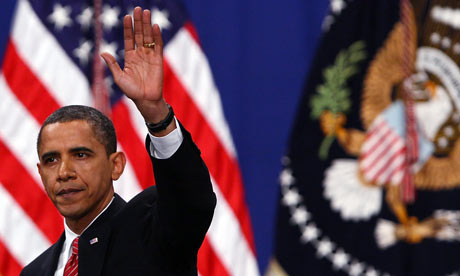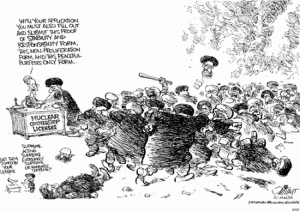A sample text widget
Etiam pulvinar consectetur dolor sed malesuada. Ut convallis
euismod dolor nec pretium. Nunc ut tristique massa.
Nam sodales mi vitae dolor ullamcorper et vulputate enim accumsan.
Morbi orci magna, tincidunt vitae molestie nec, molestie at mi. Nulla nulla lorem,
suscipit in posuere in, interdum non magna.
|
So with Al Quaeda essentially not hiding in Afghanistan — and certainly not operating terrorist training camps any more — why should the United States care about the Talban and a political “insurgency”? Our role is not to maintain of support the “national security forces” of third-world countries. Civil wars are the business of those fighting them. President Obama set a deadline, but this deployment has no defined mission and no clear objective. And for centuries Afghanistan has been the graveyard of foreign armies, including the Soviet Union. This is a tried-and-true recipe for disaster.

US General McChrystal Vows to Take Battle to Taliban [The Guardian].
McChrystal drew a distinction between al-Qaeda terrorists operating in Afghanistan, who he said were few in number and largely limited to non-combat support roles, and insurgents such as the Taliban. “What we are actually going to do is degrade al-Qaeda and prevent them being a threat and build up Afghan national security forces so they can deal with it effectively and so they will need less help. “We can significantly impact Taliban capacity in the timeframe of 18 months. We need to convince them … that [the insurgency] is a losing proposition.”
Posted via web from glenn’s posterous
The Führer’s still dead, or is he? Tests on Skull Fragment Cast Doubt on Adolf Hitler Suicide Story [The Observer] . Sixty-four years later, the world remains in the dark about what really happened in Adolph Hitler’s bunker on April 30, 1945. And it appears that, just as with the JFK assassination, the Soviets are in the middle of it, as they hid what are claimed to be Hitler’s bones, supposedly found burned outside his underground Berlin safe house, from the Allies until 2000. But the most interesting part is that DNA tests show the skull is from a female. If it’s not Eva Braun, then maybe Hitler was really a woman?
There are lots of ways paternalistic regulation chafes against liberty and personal freedom, from helmet laws to consumer protection statutes. They personally drive me absolutely crazy. What business is it of government if as an individual one chooses to engage in “risky” behavior? Since I am paying (yes, a LOT of money) for my own health care, and have never once used as much in benefits as premiums, how do politicians get off forcing me to change my own activities to reduce what they cavalierly decide are socially-unacceptable activities?

It is one thing to give incentives to induce individual decisions beneficial to a country’s citizens as a whole, for instance tax credits for green appliances. But mandates are a completely different thing. What if I just adore incandescent bulbs and want to keep using them? What if, as is decidedly the case, I prefer to listen my iPod with ear-bud speakers and full volume, not using “soundcheck“? There is no conceivable reason I should not be permitted to do so.
That means, for me, that however much I like Europe — and as a Formula One fan it is certainly a very desirable continent — I would never live there. Just yesterday, the European Union parliament proposed requiring all MP3 manufacturers to put a volume “governor” on their products, to protect users’ hearing. EU to MP3 users: Turn that down!. Well, like Lynyrd Skynyrd, I say “turn it up!” This is paternalistic regulation at its worse.
Wait, you disagree? Sorry, couldn’t hear what you said.
Pat Oliphant’s editorial cartoon today captures the disconnect between global geopolitics and the people-powered “almost revolution” going on in Iran these days. Diplomacy and NGOs like the United Nations will remain basically unchanged no matter what. Sadly true. I am afraid the demonstrators are on their own and it seems a vicious crack-down is coming soon.

Pat Oliphant 23 June 20009
Posted via email from glenn’s posterous
This weekend’s events in Iran were stirring, scary and historic. More about the impact of social media and technology later, but for now just look at this near real-time photo posted via TwitPic from Tehran as of Monday afternoon. It has all the qualities to become an iconic image of these protests and what increasingly appears to be evolving before the world’s eyes — not on major television or newspaper media, which are largely repeating posts from the Twittersphere —into either a popular revolution or prelude to a massive and violent crack-down by the clerics.

As Mike Madden writes today in Salon, of course “social media is documenting the Iranian revolution — not leading it.” But that still requires media exposure, coordination and communication, all of which Twitter supplies in spades. No, social media will not bring down Ahmadinejad, the Iranian people can only do that. Imagine if Tom Paine in 1775 or Cory Aquino in 1987 had the one-to-many power of social networking communication instead of pamphlets and radio. Just as “Internet time” speeds up the old world, so too does social media — whether China, Iran or otherwise — provide a new and powerful tool for political revolution.

Posted via email from glenn’s posterous
This post illustrates that even countries with legal traditions very different from that of the United States can teach Americans something about values. In France, criminal investigations follow the “j’accuse” model, under the Code pénal, where a single judge — known as the Juge d’Instruction — controls investigation and charging of suspects, and under which a defendant’s silence can be held against him and the burden of proof is far less than the “beyond a reasonable doubt” standard required here. France has also taken a rather different approach to civil law on the Internet, for instance holding Yahoo! liable for anti-semitic postings by users.
But these differences also go in another direction. Several weeks ago the French Assembly passed a measure, known as the “three strikes” law, that required ISPs to terminate Internet access for users found to have downloaded copyrighted materials at least three times. That law has now been set aside as unconstitutional (yes, France actually has a constitution!) by the French courts.
The French Constitutional Council ruled Wednesday that the law’s reliance on the government committee to make decisions on when to cut off people’s Internet access made it incompatible with the French Constitution. Since the “Internet is an element of freedom of speech and the right to consume,” only a judge has the power to deprive someone of it, according to the decision.
As a result, the law will be enacted without the “third-strike” of cutting off Internet access. Instead the government agency only will be permitted to send out mail and email warnings to suspected pirates. If it wants to further sanction an alleged illegal downloader, it will have to go to court.
Sarkozy’s Web-Piracy Fight Dealt Blow [WSJ.com].
While the decision rests ultimately on what we in the U.S. would term separation-of-powers, namely the relationship among different branches of government, it also introduces a concept completely alien to the American legal system. Although the Declaration of Independence starts with several self-evident truths, “liberty” and the First Amendment have never been interpreted to protect a “fundamental right” to communicate via the Internet, let alone break copyright laws. So in the U.S., a government agency can access one’s Internet usage from an ISP without a warrant (and sometimes without a subpoena) and a subscriber’s relationship with his or her ISP is a creature of private contract, not statutory, let alone constitutional, protection.
I am not suggesting that America adopt any or all of the French code-based legal system. What I believe this shows, however, is that even cultures which most Americans would regard as less concerned with the basic freedoms of its citizens — Americans would never stand for a system under which prosecutor and judge were combined in a single agency, judge or other government official — can teach us something about the values underlying the legal relationship of people to their government. Here in America we are blessed with constitutional rights. But basic human needs, like housing, jobs and medical care, are not a legal right. Internet access is very important to success in today’s economy, and I for one suggest that perhaps a debate on whether relegating that issue to the private, unilateral terms of service (ToS) of ISPs and Web site operators is a paradigm that is unlikely to be successful in the long term.
Goodbye “freedom fries.” You Frenchies aren’t so bad after all.
It was 20 years ago today (thanks, John & Paul…) that China sent its military into Tienanmen Square to put down a student-led uprising devoted to inculcating Western democratic values into the PRC. The photos of that young man standing in front of a row of tanks will never lose their place among the most famous images in history.
 Tienanmen Square 1990 But imagine if the Tienanmen protests had been coupled with the power of the Internet, especially social media. Just as news is dispersed even quicker on Twitter than Web-powered news sites — which themselves compress the news cycle to hours from days — the immediacy of social media provide a fertile ground for mass gatherings and other grassroots organizing efforts. In the U.S., we can see this with Tweetsgiving and the like, plus MoveOn and other progressive political activists. In the authoritarian parts of our world, however, it is the opposite.
The answer to the imaginary question is that if Twitter and other social media networks had been available in China, Shanghai might already be free, more than economically. One can see this clearly from the reaction of the Chinese party to social media in its preparations to bury anniversary celebrations of the Tienanmen massacre. China Blocks Twitter, Flickr, Bing, YouTube and Hotmail Ahead of Tiananmen Anniversary [guardian.co.uk]. It is hardly different from Iran, for example, which banned Facebook for nearly ten days leading up to its recent elections, or Cuba and other repressive regimes blocking Internet technology and sites in order to control propaganda. But the significance is overwhelmingly real. ”Information wants to be free,” the old watchword of hacking and digital freedom proponents, is alive and well in this Web 2.0 era. Just check out the trending Twitter topic #ChinaBlocksTwitter to see for yourself.
Charging a Google executive criminally for a YouTube video is almost as crazy as indicting the Williams F1 Team in 1994 for manslaughter in the aftermath of the racing death of Formula One legend Aryton Senna. Google Execs on Trial in Italy Over Video” [Digital Media Wire]. Thank goodness for jury nullification, because under no rational legal system can hosting a Web video be considered a personal crime by corporate officer
A great headline out of Australia. It’s the Law: Men Do Fewer Chores [Sydney Morning Herald]. But the story is actually that because the Aussie Federal Sex Discrimination regulations offer “an inadequate level of protection for men against discrimination on the basis of family responsibilities it provides a strong disincentive for men to take on a greater care-taking role within the family unit.” Not so different from the US, where despite FMLA, men are still actively prevented from taking paternity leave or using flex-time work arrangements.
|
|






